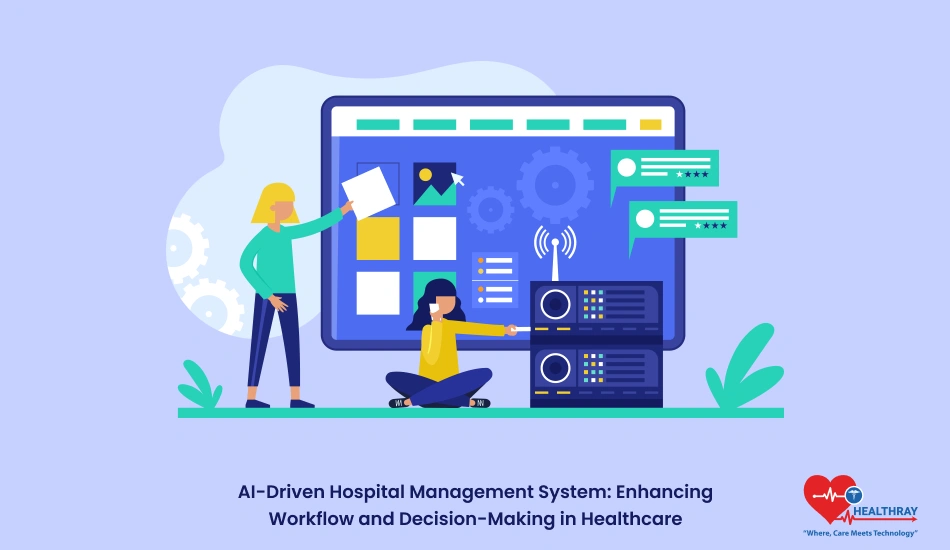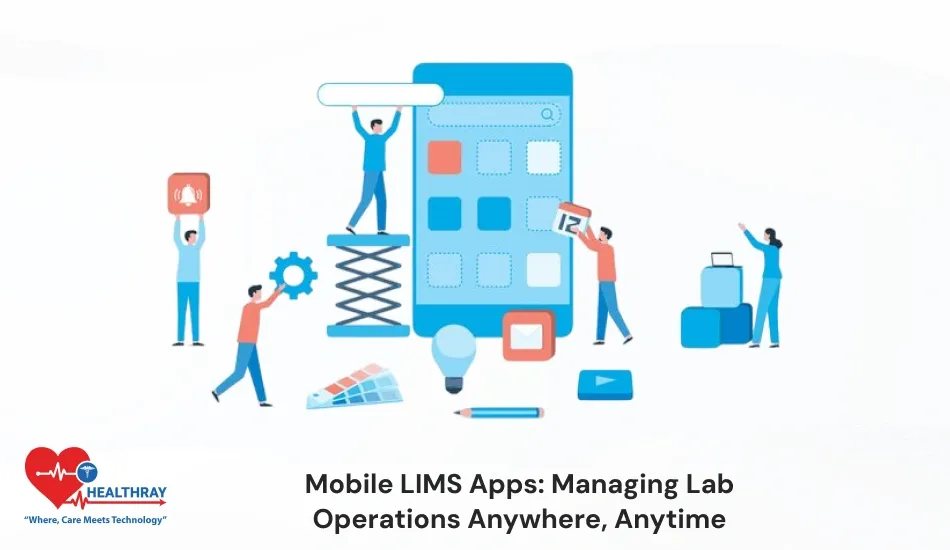Artificial intelligence is no longer just a futuristic concept; it’s changing the way hospitals operate today. For hospital administrators and healthcare IT managers, integrating AI into management systems promises faster workflows, smarter decisions, and better patient outcomes. From scheduling appointments to analyzing patient data, AI is reshaping how hospitals manage their operations and provide care.
This post digs into how the AI-powered hospital management systems are upgrading the workflow as well as decision-making abilities. Read on to explore the impacts of technology concerning efficiency, clinical decisions, and predictive analytics, among other hands-on steps involving AI implementation in healthcare sites. Whether it is your maiden exploration of AI or you plan to improve on the one already available, this tutorial has all you need.
Enhancing Workflow Efficiency
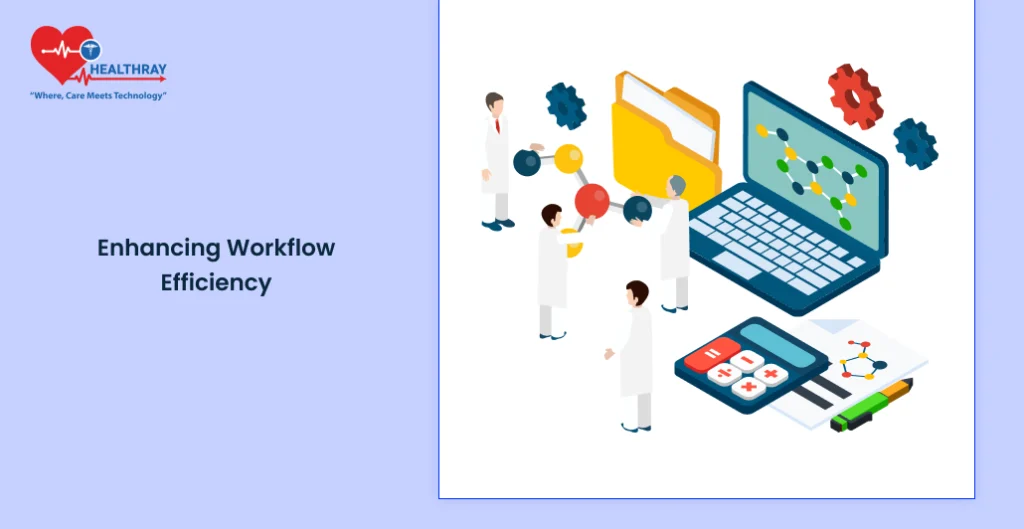
Managing a hospital involves juggling countless tasks, from scheduling appointments to tracking inventory. AI-driven systems take over repetitive and time-consuming processes, allowing staff to focus on patient care.
For instance, AI can streamline appointment scheduling by analyzing patterns in patient visits and staff availability. This minimizes double-booking and reduces waiting times. Similarly, automated billing systems powered by AI can process invoices faster, reducing errors and improving cash flow.
AI also improves resource allocation. It tracks the use of equipment and supplies, ensuring they’re available when needed. This prevents shortages and reduces wastage, saving costs and improving efficiency.
Hospitals that employ AI-driven systems often report having fewer operational bottlenecks, smoother workflows, and happier staff. It’s not only about saving time; it is about ensuring every resource is utilized to create better patient care.
Supporting Clinical Decision-Making
Clinical decisions are at the heart of patient care, and even small improvements can make a big difference. AI tools are empowering healthcare providers by turning complex data into actionable insights, ensuring faster and more accurate diagnoses and treatments.
AI systems analyze patient records, lab results, and imaging data to identify patterns that might be missed by the human eye. For example, algorithms can detect early signs of diseases like breast cancer or predict the likelihood of complications in critical care patients. This allows doctors to act quickly and confidently.
Other pros include personalized treatment plans because AI in healthcare considers all the necessary factors of the patient that help in suggesting tailor-made intervention. It’s not intended to replace the doctors rather enhance their capabilities to cater health care with recommendations backed up by data.
As these tools evolve, they are also integrating seamlessly into workflows. Many hospitals now use AI-driven platforms that alert clinicians to potential issues, such as adverse drug interactions, helping to avoid errors and improve patient safety.
By supporting decision-making, AI not only reduces the cognitive load on healthcare providers but also ensures that patients receive the right care at the right time.
Predictive Analytics in Healthcare
Hospitals often face challenges like overcrowded emergency rooms, resource shortages, and unexpected patient outcomes. Predictive analytics powered by AI is helping healthcare facilities stay ahead of these issues by offering valuable foresight.
Using historical and real-time data, AI systems can forecast patient admission rates, helping hospitals manage their capacity better. For example, predictive models can estimate the number of beds, staff, and equipment needed during flu season or other high-demand periods. This ensures resources are allocated efficiently and minimizes patient wait times.
AI also identifies at-risk patients who are likely to suffer complications. Through analyzing patient health records and risk factors, predictive tools may identify patients for early intervention in the hopes of avoiding the worst possible outcomes. Examples include patients who are likely to develop sepsis or readmission.
Additionally, predictive analytics enhances operational efficiency. Hospitals can anticipate supply chain needs, ensuring critical items like medications and surgical supplies are always in stock. This reduces costs and avoids last-minute disruptions.
With predictive analytics, hospitals can shift from reactive to proactive care, improving both operational performance and patient outcomes. It’s about making decisions based on data, not just intuition.
Implementation Strategies
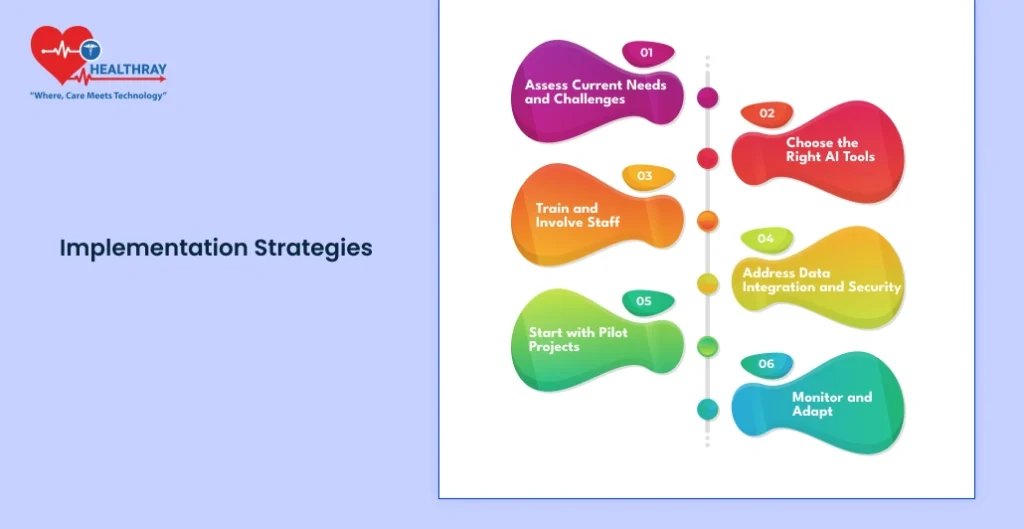
Introducing AI into a hospital management software is an exciting opportunity, but it requires a well-planned approach to ensure success. Here’s how hospital administrators and healthcare IT managers can pave the way for a smooth transition.
Assess Current Needs and Challenges
Start by evaluating the hospital’s current workflow, identifying inefficiencies, and pinpointing areas where AI could make a measurable impact. This might include patient scheduling, billing systems, or clinical decision support.
Choose the Right AI Tools
Not all artificial intelligence systems are created equal. Choose solutions that cater to your particular needs and that integrate seamlessly with existing technology. Look for platforms that can produce results in similar environments of hospitals and have robust technical support.
Train and Involve Staff
AI adoption isn’t just about the technology; it’s about the people who use it. Offer comprehensive training sessions to help staff understand and embrace the new tools. Highlight how AI will reduce their workload and improve outcomes, ensuring buy-in from both clinical and administrative teams.
Address Data Integration and Security
Hospitals manage vast amounts of sensitive data. Ensure that your AI system can seamlessly integrate with existing electronic health records (EHR) and complies with regulations like HIPAA or GDPR. Prioritize data encryption and robust security measures to maintain patient trust.
Start with Pilot Projects
Before rolling out AI across the entire hospital, test it in specific departments or processes. For instance, start with appointment scheduling or diagnostics. Use the results to refine the system and build confidence among stakeholders.
Monitor and Adapt
AI systems learn and evolve over time, but they also require regular monitoring. Establish performance metrics to track their effectiveness and make adjustments as needed. Feedback loops from staff and patients are invaluable for ongoing improvement.
By taking these steps, hospitals can ensure that AI integration is not just a technological upgrade but a transformative shift toward better healthcare delivery.
Case Studies
Real-world examples offer valuable insights into the potential of AI in hospital management. These case studies highlight how hospitals have successfully implemented AI-driven systems to improve workflows and patient outcomes.
Optimizing Emergency Room Operations
A mid-sized urban hospital faced chronic overcrowding in its emergency department. By deploying an AI-powered predictive analytics tool, they identified peak times for patient visits and adjusted staffing accordingly. The result? A 20% reduction in patient wait times and improved satisfaction scores.
Enhancing Diagnosis Accuracy
For example, a top hospital now has an AI diagnostic algorithm that helps the radiologist to detect early-stage cancer. The system analyzed their imaging data and flagged these abnormalities with 95 percent accuracy. This was not just faster but also reduced many false negatives and ensured effective follow-up treatment for patients without being overdue.
Streamlining Appointment Scheduling
A rural hospital struggled with inefficient scheduling that often led to no-shows and underutilized resources. An AI-driven scheduling system was introduced to predict patient behavior and optimize appointment slots. Over six months, appointment adherence improved by 30%, boosting operational efficiency and patient access to care.
Preventing Hospital Readmissions
A large health network employed AI to analyze patient data, predict readmission risks, and target high-risk patients with follow-ups and tailored discharge plans. This resulted in a 15% decrease in 30-day readmission rates, saving millions in penalties and costs.
Managing Inventory and Supplies
One hospital implemented an AI tool to track and predict inventory needs. By analyzing historical usage patterns and current demand, the system reduced waste and ensured critical supplies were always available. This resulted in cost savings of over 25% annually.
These examples demonstrate that AI-driven hospital management systems are not just theoretical but deliver tangible results across diverse settings. Whether improving efficiency or enhancing care, AI is transforming hospitals into smarter, more patient-focused organizations.
Regulatory and Ethical Considerations
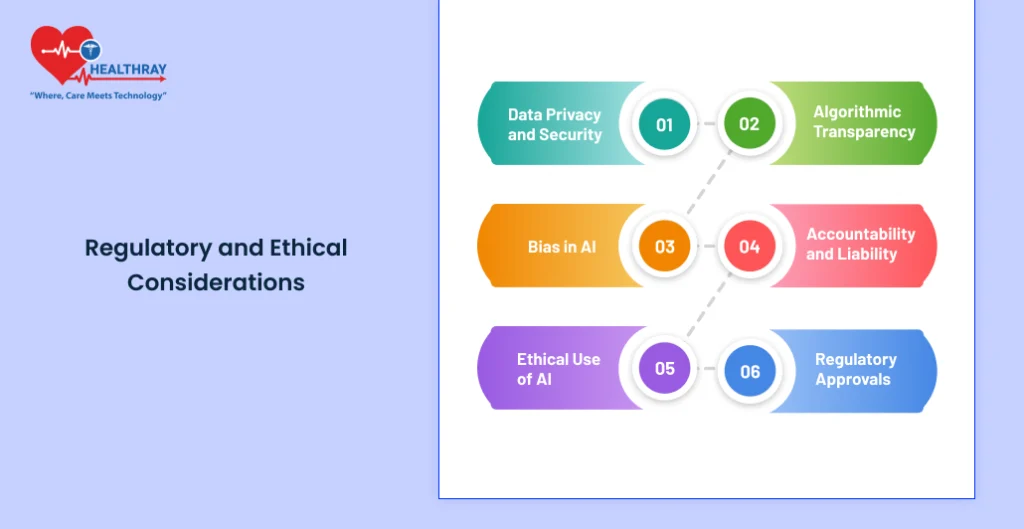
AI’s integration into hospital management systems brings immense benefits, but it also raises critical regulatory and ethical questions. Addressing these concerns is essential to ensure responsible and effective use.
Data Privacy and Security
AI systems are dependent on the vast data that hospitals process regarding patients’ sensitive information. Ensuring compliance with the relevant laws in the US (HIPAA) or in Europe (GDPR) is necessary. Data encryption, anonymization, and strict access controls have to be integrated into an AI system to maintain the confidentiality of patients.
Algorithmic Transparency
AI algorithms often operate as “black boxes,” making decisions without clear explanations. For hospital administrators and IT managers, it’s crucial to choose systems that provide transparency in their decision-making processes. Clinicians and staff need to trust the technology, especially in critical areas like diagnostics and treatment recommendations.
Bias in AI
AI systems are only as unbiased as the data they are trained on. If training datasets are skewed, the AI could perpetuate inequalities in care. Hospitals must work with vendors to audit and address biases in AI algorithms to ensure equitable treatment for all patients.
Accountability and Liability
Who is accountable if an AI system makes an error? Clear policies should define the responsibilities of hospitals, AI vendors, and clinicians in scenarios involving AI-driven decisions. Hospitals must also establish guidelines for human oversight to avoid over-reliance on AI.
Ethical Use of AI
AI in health must always look out for the well-being of patients. This ranges to informed consent when AI systems make use of diagnostics or treatment choices for patients. Hospitals must also make disclosures to the patients regarding their levels of participation in AI services.
Regulatory Approvals
Healthcare is a highly regulated industry, and AI systems must meet rigorous standards before deployment. Hospitals should verify that AI tools comply with local and international regulations, ensuring they are safe and effective for clinical use.
By addressing these regulatory and ethical considerations proactively, hospitals can build trust in AI-driven systems while ensuring they operate within the bounds of the law and ethical standards.
Future Trends in AI-Driven Hospital Management
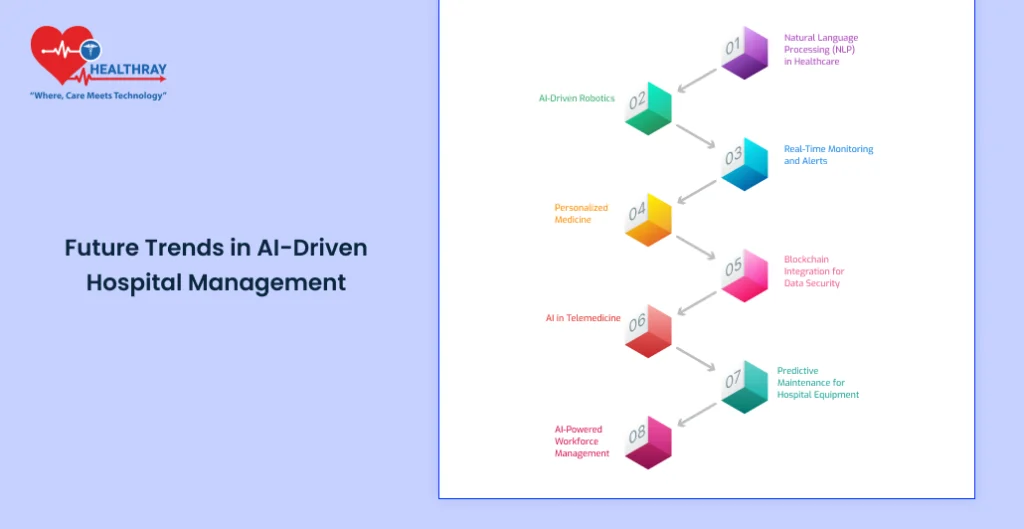
The role of AI in hospital management continues to evolve, with new technologies and applications emerging every day. These advancements promise to further streamline operations, enhance patient care, and improve decision-making.
Natural Language Processing (NLP) in Healthcare
AI-powered NLP tools are revolutionizing how hospitals manage data. From transcribing physician notes to extracting insights from unstructured data, NLP can save hours of manual work. This technology is also making patient interactions smoother with chatbots and virtual assistants.
AI-Driven Robotics
Robots are increasingly being used in hospitals, especially in surgical procedures and logistics. AI-enabled robots assist in transporting medical supplies, disinfecting rooms, and even supporting complex surgeries with precision guidance.
Real-Time Monitoring and Alerts
Wearable devices and IoT sensors connected to AI systems are enabling real-time patient monitoring. These tools can detect anomalies in vital signs and alert clinicians instantly, improving response times and saving lives.
Personalized Medicine
AI is set to push personalized care even further by analyzing genetic data and tailoring treatments to individual patients. This approach not only improves outcomes but also minimizes side effects.
Blockchain Integration for Data Security
Combining AI with blockchain technology enhances data security and transparency. Blockchain ensures secure sharing of medical records, while AI processes the data for actionable insights.
AI in Telemedicine
With the rise of telehealth, AI is enhancing remote consultations. From analyzing symptoms via video calls to recommending follow-up care, AI is making telemedicine more robust and accessible.
Predictive Maintenance for Hospital Equipment
AI is being used to predict equipment failures before they occur, ensuring critical machines are always operational. This reduces downtime and prevents disruptions in patient care.
AI-Powered Workforce Management
AI tools are optimizing staffing by analyzing patterns in patient flow and staff availability. Hospitals can predict peak hours and allocate resources accordingly, ensuring both efficiency and employee satisfaction.
The future of AI in hospital management is about more than just improving processes. It’s about creating smarter, more responsive healthcare systems that prioritize both patient and staff well-being.
Conclusion
AI-driven hospital management systems are not just a technological upgrade; they are a transformative force in healthcare. By streamlining workflows, supporting clinical decisions, and predicting patient needs, AI enables hospitals to operate more efficiently while enhancing patient outcomes.
For hospital administrators and healthcare IT managers, adopting AI is more than innovation. It’s a strategic move to overcome the everyday challenges that exist, from wait times to resource utilization. Sure, there may be some bumps along the way, such as training and regulatory compliance, but in the long run, the benefits are there.
Hospitals embracing AI today are actually setting themselves up for a smarter, more connected future. Whether improving operational efficiency, advancing patient care, or staying ahead of industry trends, AI offers the tools to make it happen.
Now is the time to explore how AI can transform your hospital, ensuring better care for patients and a smoother experience for staff.
